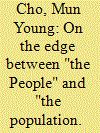| Srl | Item |
| 1 |
ID:
086693


|
|
|
|
|
| Publication |
2009.
|
| Summary/Abstract |
Not since China's economic reforms has there been such an outpouring of care and attention given to rural migrants in cities. However, there is a gap between the politics of rights as established at the national level and as ignored among rural migrants themselves. My ethnography of a rag-picking migrant woman in Harbin examines why and how this gap occurs through what I call "forced flexibility." It means the troubling processes by which the migrant's desire to make a permanent home is disrupted by the coupling of increasing conflicts over land rights and urban policies that privilege urban household registration holders. Tracing the migrant's struggles to reclaim her rural land as well as to purchase urban housing, this article suggests that the predicaments of rural migrants occur because these migrants are not merely excluded, but also included "through exclusion" in a post-Mao fantasy that guarantees their rights and, simultaneously, limits them through numerous modifications and exceptions at the local level.
|
|
|
|
|
|
|
|
|
|
|
|
|
|
|
|
| 2 |
ID:
095305


|
|
|
|
|
| Publication |
2010.
|
| Summary/Abstract |
This article examines how local resistance against government attempts to reduce poverty to a technical problem ironically reinforces the precarious state of the poor. It looks at the workings of the minimum livelihood guarantee (dibao) through mundane interactions between street-level officials and poor residents in a workers' village on the periphery of Harbin. As the party-state's primary policy for urban poverty, dibao has introduced a new rationality that poverty is calculable and flexible. Urban laid-off workers have resisted this by invoking the socialist claim that they are "the people." I examine how this resistance has led street-level officials to be preoccupied with the old socialist norm of "an ability to work" rather than with "income" as dibao's official criterion. The new local criterion has produced the ironic effect that urban laid-off workers, who were understood to be dibao's main target, have been mostly excluded from the scheme.
|
|
|
|
|
|
|
|
|
|
|
|
|
|
|
|
| 3 |
ID:
153345


|
|
|
|
|
| Summary/Abstract |
How has social work, which has emerged as a distinct profession in the PRC with the full support of the party-state, come to produce neoliberal outcomes similar to those found in other, capitalist countries? In this article, I draw attention to the government purchase (goumai) of social work services, which is commonly considered as confirmation of state capacity and leadership rather than the passing on of state responsibilities to civil sectors with tight budgets. Ethnographic research on the actual social work practices in Shenzhen's Foxconn town reveals how neoliberal-style outsourcing has converged with diverse historical legacies, thus creating precarious labour conditions for frontline social workers. Neoliberal dynamics end up filling most of these social work positions with migrant youth from the countryside, reproducing and perpetuating China's rural–urban divide. Institutional efforts at social care may not only reduce the existing inequalities but may also rely upon and even reinforce them.
|
|
|
|
|
|
|
|
|
|
|
|
|
|
|
|